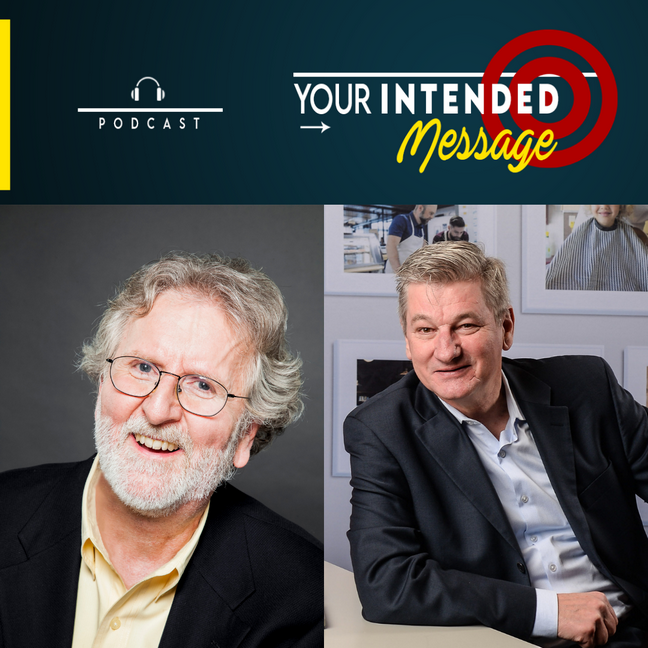Story Telling Secrets from Hollywood: Michael Hauge
In this podcast episode, host George Torok interviews Hollywood storyteller and scriptwriter Michael Hauge.
They discuss the importance of storytelling in various contexts, including business and public speaking. Hauge emphasizes the power of stories to engage and connect with audiences on an emotional level.
He shares his six-step story structure called the "six-step success story" and provides advice on how to craft compelling narratives. They also touch on the concept of finding a powerful moment in a story, the aftermath of a story, and the value that stories bring to others. The episode concludes with a reminder to engage with the podcast and look forward to more practical insights.
The Importance of Emotional Experience [00:03:11]
Michael explains that the primary objective of a great story is to create an emotional experience, as emotions are what ultimately drive decisions.
Creating Empathy with the Hero [00:05:52]
Michael discusses the importance of creating a subconscious connection between the audience and the main character of the story, allowing them to psychologically become the hero and experience the story as if it were happening to them.
Elements of a Powerful Story [00:10:34]
Michael outlines the key elements of a good story, including the presence of a hero, a goal, conflict, and transformation, emphasizing that conflict and emotional growth are essential for a captivating and persuasive narrative.
The importance of storytelling for financial advisors [00:12:45]
Explains how storytelling can help financial advisors connect with clients and build trust by sharing relatable stories.
The structure of storytelling in Hollywood and business [00:14:04]
Discusses the formula and structure that stories follow, and how it can be applied to business storytelling to make presentations more engaging and successful.
Overcoming the resistance to storytelling [00:15:31]
Addresses common concerns about not having special stories to tell and explains that relatable experiences and emotions are what make stories impactful, not extraordinary achievements.
Goal of becoming a successful radio host [00:24:44]
Discussion on the importance of having a clear and specific goal in storytelling and the challenges of a long-term goal.
Overcoming feelings of inadequacy [00:26:26]
Exploration of the speaker's struggle with feeling inferior and the goal of becoming more comfortable talking to people of higher status.
Interviewing Nuala Beck [00:28:35]
The speaker's goal of interviewing economist Nuala Beck and the desire to have a successful interview where she appreciates his understanding of her book.
The climax of the story [00:35:29]
The speaker shares a personal experience of interviewing Richard Benjamin and asking him a unique question, which leads to a powerful moment.
The aftermath of the story [00:37:36]
The speaker discusses the importance of the aftermath of a story, where the audience learns about the new life or growth that the protagonist experiences after the climax.
The six steps of storytelling [00:41:03]
The host and speaker briefly mention the six steps of storytelling, including the setup, crisis, pursuit and conflict, climax, and aftermath. They also mention a chart available on the speaker's website for further guidance.
The Power of Storytelling: A Conversation with Hollywood Storyteller Michael Hauge
As a podcast host, I've had the privilege of engaging with some of the most fascinating minds in various industries. One such individual is Michael Hauge, a Hollywood storyteller and scriptwriter. In our recent conversation, we delved into the art of storytelling and its profound impact on business and public speaking.
Meeting Michael Hauge: The Hollywood Storyteller
Michael Hauge is not your average Hollywood scriptwriter. His experience ranges from coaching Hollywood power couple Will Smith and Jada Pinkett Smith on a script, to a popular YouTube interview on story structure, and even a stint as a department store Santa Claus.
The Power of Emotional Storytelling
During our conversation, I asked Michael why business leaders, sales reps, managers, and CEOs need to tell more stories. His response was simple yet profound: the primary objective of a great story is to create an emotional experience.
Hollywood, the capital of emotional storytelling, has mastered the art of creating stories that elicit emotions. By applying Hollywood principles to business stories, leaders can create powerful narratives that persuade their prospects to take action.
The Role of Emotions in Storytelling
When asked about the type of emotions to tap into, Michael advised against boredom. Instead, he suggested focusing on emotions like excitement, inspiration, laughter, and occasionally sadness or fear. The goal is to create a deep empathy between the audience and the main character of the story. This emotional investment makes the audience more likely to take the desired action.
The Art of Relatable Storytelling
Michael confirmed that in storytelling, the audience often sees themselves as the main character. This is why it's crucial to focus on relatable difficulties and desires that the audience can identify with.
He reassured that stories don't have to be about extraordinary achievements. Instead, they should focus on relatable difficulties and desires that the audience can identify with.
Storytelling as Stealth Marketing
Michael also touched on the concept of storytelling as a form of stealth marketing. By including stories that relate to their target audience's goals and aspirations, speakers can build trust and connection with their audience.
Crafting a Compelling Story
When it comes to crafting a compelling story, Michael emphasized the importance of having a clear and specific goal. He used the example of wanting to tell a story about becoming a successful radio host over 19 years.
He advised focusing on one particular goal within the job and making that the conflict of the story. For instance, feeling inadequate when talking to people perceived as being above one's pay grade.
The Climax and Aftermath of a Story
Michael also discussed the importance of finding a powerful moment in a story, which he refers to as the climax. This is followed by the aftermath, which reveals the new life or growth that occurred as a result of the journey.
The Six-Step Success Story
Towards the end of our conversation, Michael introduced his six-step story structure called the "six-step success story." These steps include setup, crisis, pursuit, conflict, climax, and aftermath.
For those interested in learning more about this structure, you can find a one-page chart outlining these steps on Michael's website, storymastery.com.
Conclusion
Our conversation with Michael Hauge was a deep dive into the power of storytelling. Whether you're a business leader, a sales rep, a manager, or a CEO, understanding and harnessing the power of storytelling can significantly enhance your ability to connect with your audience and persuade them to take action.
Remember to like, comment, and share our podcast, and return for more practical insights on delivering impactful messages.

